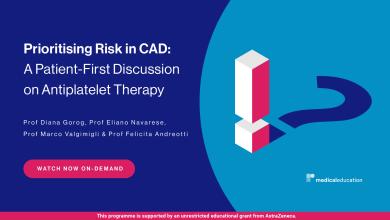Search results
Novel Oral Antiplatelet Agents
Author(s):
Suzanne J Baron
,
Robert P Giugliano
Added:
3 years ago
Article
Author(s):
Franz-Josef Neumann
Added:
3 years ago
Acute coronary syndromes (ACS) have been associated with the occurrence of cardiovascular (CV) events. Moderate- to high-risk ACS are generally managed by an early invasive approach, where coronary angiography is followed by percutaneous coronary intervention (PCI) or coronary artery bypass grafting (CABG). However, ACS and the use of PCI or CABG are associated with a high risk of thrombotic…
View more
Author(s):
Diego Penela
,
Maríbel Diaz-Ricart
,
Magda Heras
Added:
3 years ago
The usual underlying mechanism of acute coronary syndromes (ACSs) is a thrombotic event caused by the rupture or erosion of an atherosclerotic plaque. In this scenario, platelets and thrombin are key players. Thus, understanding the physiopathology of platelet activation is of paramount importance in the treatment of acute coronary ischaemia. There is ample evidence showing that adequate…
View more
Author(s):
Patrick Wong
,
Umair Shafique
Added:
3 years ago
Cardiovascular (CV) events are a major cause of mortality worldwide1 that are often precipitated by acute coronary syndromes (ACS). ACS result from the acute obstruction of coronary arteries and are defined as either unstable angina (UA) or myocardial infarction (MI), with or without ST-segment-elevation (STEMI and NSTEMI, respectively). Patients with moderate- to high-risk ACS are managed by an…
View more
Author(s):
Sasha Koul
,
David Erlinge
Added:
3 years ago
Acute coronary syndromes (ACS) are a major reason for death and morbidity in the industrialised world. One of the most successful treatments for ACS has been strategies to target the platelets and inhibit their function.
Mechanisms of Platelet Activation
Thrombus formation in the arteries is dependent on platelets and their ability to attach to the injured wall despite the rapid arterial blood…
View more
Author(s):
Kerry Layne
,
Albert Ferro
Added:
3 years ago
Acute coronary syndrome (ACS) is a term used to encompass unstable angina (UA) and myocardial infarction (MI) with or without electrocardiographic (ECG) evidence of ST-segment elevation. Antiplatelet therapy has formed the backbone of ACS management for decades and the drug class continues to evolve as novel agents with increasingly efficacious antiplatelet actions are identified. The main risk…
View more
Author(s):
Renata Cífková
Added:
3 years ago
Hypertension is the most prevalent cardiovascular disease affecting 20–50 % of the adult population.1 Elevated blood pressure has been identified as a risk factor for coronary heart disease (CHD), heart failure, stroke, peripheral arterial disease, renal failure and atrial fibrillation both in men and women in a large number of epidemiological studies.2–4 So far, the largest meta-analysis of…
View more
Author(s):
Laurent Bonello
Added:
3 years ago
Clopidogrel is a key antiplatelet agent that inhibits the second step of platelet aggregation through blockade of the P2Y12-adenosine diphosphate (ADP) receptor.1 Its use has enabled percutaneous coronary intervention (PCI) to expand by dramatically reducing thrombotic complications in acute coronary syndromes (ACSs).2,3 Since the first report by Jaremo et al. of a large inter-individual…
View more
Prioritising Risk in CAD: A Patient-First Discussion
Video Series
Author(s):
Felicita Andreotti
,
Diana Gorog
,
Marco Valgimigli
,
et al
Start date:
Dec 14, 2023
View more











